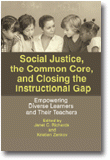
Social Justice, the Common Core, and Closing the Instructional Gap
Empowering Diverse Learners and Their Teachers
Edited by:
Janet C. Richards, University of South Florida
Kristien Zenkov, George Mason University
Published 2015
There is little doubt that the Common Core State Standards (CCSS) are a controversial entity. They are provocative for the way in which they have been developed, for the ways they are being implemented and evaluated, for their content, and for their failure to explicitly consider the needs, interests, and histories of diverse populations. While the CCSS continue to be problematized by critics around the country—including the editors of this volume—it is evident our nation is moving toward (some would argue we have arrived at) a national set of standards and/or a national curriculum. This text will be an important volume for multiple audiences, in large part because it will bring together critical perspectives on the CCSS and the notion of national standards/curricula. It will simultaneously provide a social justice orientation as a way to interpret the CCSS and respond to their limits, while presenting practical examples of social justice‐oriented, CCSS‐focused curricula that empower diverse learners and their teachers.
Social Justice, the Common Core, and Closing the Instructional Gap will consist of chapters by classroom teachers and university scholars who portray honest, engaging, first‐person accounts of their successes and challenges connecting a social justice pedagogical orientation to the Common Core State Standards. These authors candidly and passionately share the challenges of navigating between a social justice curriculum and high stakes standards‐ and test‐driven environments. They highlight their accomplishments that include effectively supporting students to consider social injustices and devise plans to work toward a more equitable world.
CONTENTS
Section I: Setting the Stage for a Social Justice Consideration of the Common Core. Foreword, Bill Ayers. Introduction—Translating Social Justice Values Into Effective Practices: The Integration of a Social Justice Stance in an Age of the Common Core, Kristien Zenkov and Janet C. Richards. Section II: Contexts of Social Justice Education and the Common Core. Long and Winding Roads: Constructs for Social Justice and the Nature of American Public Education, John A. Cassell. Section III: Social Justice, the Common Core, and the Now. “She’s My Right Hand”: Teacher Collaboration for Linguistically Diverse Students’ Equitable Access to Curriculum, Megan Madigan Peercy, Megan DeStefano, Bedrettin Yazan, and Melinda Martin Beltran. “Locating Coyote”: Reorienting the Literacy Curriculum to Empower Indigenous Students and Educators, Margaret Vaughn, D’Lisa Penny Pinkham, Traci McKarcher, Sheila Hewett, Kelly Hillman, Breanna Terry, Cindy Latella, and Terry Whipple. It All Started With One Book: How Trash Created Something Beautiful, Rebecca Lovering Powell, Allison Papke, and Jenifer Jasinski Schneider. Teaching for Social Justice AND Standards: Lessons in Secondary English Language Arts, Alison G. Dover. Class On Fire: Using the Hunger Games Trilogy to Encourage Social Action, Amber M. Simmons. “We’re Gonna Run the World”: Empowering High School Readers, Carol Delaney and Lori Czop Assaf. Turbulent and Restless Spirits: Youth Wrestle with Social Justice through Slam Poetry, Anthony Pellegrino, Kristien Zenkov, Nicholas Calamito, Christine DeGregory, and Amanda Bush. Beyond the Common Core: Teaching Social Studies and Literacy for Social Justice, Ruchi Agarwal‐Rangnath. With or Without You: The Common Core Standards and Addressing Global Climate Change, James Damico and Mark Baildon. Algebra and Literacy: A Social Justice Pairing, Frances Harper and Sheila Orr. Our Students and the “School to Prison Pipeline”, Nequai DeCosta, Kenyatta Ridley, Dawn Harris, Shawn Weisner, Jewell E. Cooper, Beverly S. Faircloth, and P. Holt Wilson. Section IV: Social Justice, the Common Core, and Beyond the Classroom. High‐Level Instruction for All Students: Reimagining Literacy Instruction, Seth A. Parsons, Jacquelynn A. Malloy, Allison Ward Parsons, and Sarah Cohen Burrowbridge. It Could Be Otherwise: Reading Specialists and Social Justice in Reading Education, Patrick Shannon. About the Editors/Authors.
-
Paperback9781681232300
Web price: $45.04 (Reg. 52.99)
-
Hardcover9781681232317
Web price: $80.74 (Reg. 94.99)
- eBook9781681232324

- EDU000000 - EDUCATION: General
- EDU007000 - EDUCATION: Curricula
- EDU029000 - EDUCATION: TEACHING METHODS & MATERIALS: General
-
 Cultivating Democratic Literacy Through the Arts
Guiding Preservice Teachers Towards Innovative Learning Spaces in ELA Classrooms
Cultivating Democratic Literacy Through the Arts
Guiding Preservice Teachers Towards Innovative Learning Spaces in ELA Classrooms
-
 Distance Learning
Volume 20 #3
Distance Learning
Volume 20 #3
-
 Distance Learning
Volume 20 #4
Distance Learning
Volume 20 #4
-
 Frameworks for Integrated Project-Based Instruction in STEM Disciplines
Frameworks for Integrated Project-Based Instruction in STEM Disciplines
-
 Reflections on People, Policy, and Practices in Curriculum History
Reflections on People, Policy, and Practices in Curriculum History
-
 Rekindling Embers of the Soul
An Examination of Spirituality Issues Relating to Teacher Education
Rekindling Embers of the Soul
An Examination of Spirituality Issues Relating to Teacher Education
-
 Supporting Leaders for School Improvement Through Self-Care and Wellbeing
Supporting Leaders for School Improvement Through Self-Care and Wellbeing

